-
 Bitcoin
Bitcoin $114400
0.68% -
 Ethereum
Ethereum $3550
2.48% -
 XRP
XRP $3.001
4.99% -
 Tether USDt
Tether USDt $0.9999
0.01% -
 BNB
BNB $757.6
1.46% -
 Solana
Solana $162.9
1.07% -
 USDC
USDC $0.9998
0.00% -
 TRON
TRON $0.3294
0.91% -
 Dogecoin
Dogecoin $0.2015
2.46% -
 Cardano
Cardano $0.7379
2.01% -
 Stellar
Stellar $0.4141
8.83% -
 Hyperliquid
Hyperliquid $37.83
-1.91% -
 Sui
Sui $3.454
0.76% -
 Chainlink
Chainlink $16.62
3.53% -
 Bitcoin Cash
Bitcoin Cash $554.6
2.84% -
 Hedera
Hedera $0.2486
3.91% -
 Ethena USDe
Ethena USDe $1.001
0.00% -
 Avalanche
Avalanche $21.95
3.34% -
 Toncoin
Toncoin $3.563
-2.85% -
 Litecoin
Litecoin $112.7
2.65% -
 UNUS SED LEO
UNUS SED LEO $8.977
0.13% -
 Shiba Inu
Shiba Inu $0.00001232
1.85% -
 Uniswap
Uniswap $9.319
2.93% -
 Polkadot
Polkadot $3.632
1.38% -
 Monero
Monero $307.2
2.36% -
 Dai
Dai $0.9997
-0.03% -
 Bitget Token
Bitget Token $4.340
0.91% -
 Pepe
Pepe $0.00001048
1.07% -
 Cronos
Cronos $0.1348
3.26% -
 Aave
Aave $261.5
1.93%
How does NFT Music change the revenue model of the music industry?
NFTs revolutionize music revenue, offering artists direct fan engagement, fractional ownership models, and transparent royalty payments via blockchain, though scalability and regulation remain challenges.
Mar 03, 2025 at 11:55 am
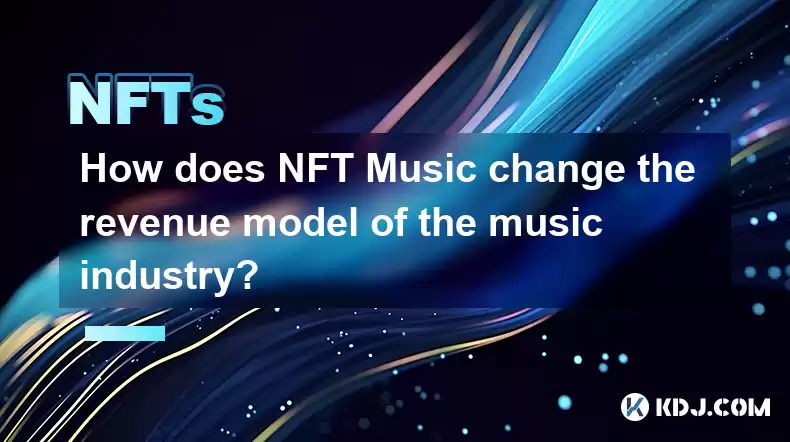
Key Points:
- NFTs offer musicians new revenue streams beyond traditional record sales and streaming royalties.
- Direct fan engagement is significantly enhanced through NFT ownership and community building.
- NFTs enable fractional ownership of musical works, creating novel investment opportunities.
- The transparency and immutability of blockchain technology benefit both artists and fans.
- Challenges remain regarding scalability, regulation, and the long-term sustainability of NFT music markets.
How Does NFT Music Change the Revenue Model of the Music Industry?
The music industry, traditionally reliant on record sales and streaming royalties, is undergoing a significant transformation with the emergence of Non-Fungible Tokens (NFTs). NFTs offer musicians a radical new approach to monetizing their work, shifting power dynamics and potentially revolutionizing the established revenue model. This change involves more direct interaction with fans and innovative ways to generate income beyond the limitations of traditional platforms.
One of the most impactful changes is the direct-to-fan sales model. Musicians can now sell NFTs representing their music, artwork, or even exclusive experiences, bypassing intermediaries like record labels and streaming services. This allows artists to retain a larger percentage of their earnings and build stronger relationships with their fan base. The sale of NFTs isn't just a one-time event; they can also unlock ongoing revenue streams through royalties on secondary sales, a feature unavailable with traditional music distribution.
Furthermore, NFTs facilitate the creation of exclusive digital assets for fans. This might include high-resolution audio files, behind-the-scenes content, or access to virtual concerts and meet-and-greets. This increased engagement fosters a sense of community among fans, strengthening their connection with the artist and providing further avenues for revenue generation. These exclusive digital assets add value beyond just the music itself, creating a more robust and appealing offer for fans.
The concept of fractional ownership, made possible by NFTs, is another significant shift. A single song or album can be divided into multiple NFT pieces, allowing fans to own a share of the musical work. This democratizes access to ownership and provides investors with a new asset class. This model shares the revenue generated from the music amongst all NFT holders, ensuring a more equitable distribution of income than traditional models.
The inherent transparency and immutability of blockchain technology underpinning NFTs are also key advantages. Royalty payments are automatically tracked and distributed, eliminating the need for intermediaries and reducing the risk of fraud or inaccurate accounting. This transparency benefits both artists and fans, fostering trust and accountability within the ecosystem. This clear audit trail ensures that artists receive their due compensation and fans can verify the authenticity of their digital assets.
However, challenges remain. The scalability of NFT platforms, the volatile nature of cryptocurrency markets, and the lack of clear regulatory frameworks present significant hurdles to widespread adoption. The environmental impact of blockchain technology is another concern that needs to be addressed. These obstacles need to be overcome for NFT music to achieve its full potential.
The complexity of smart contracts and the technical expertise required for creating and managing NFTs can also be a barrier for smaller artists. Furthermore, educating fans about the technology and its benefits is crucial for driving wider adoption and ensuring the long-term success of NFT music. Overcoming these challenges will be vital for the sustained growth of this sector.
Despite these challenges, NFT music presents a compelling alternative to the traditional music industry model. It offers artists greater control over their work, fosters stronger fan relationships, and introduces novel revenue streams. The future of music may well involve a more decentralized and fan-centric approach, driven by the innovative potential of NFT technology. The integration of metaverse and Web3 technologies further enhances the potential for NFT music to disrupt the industry.
Frequently Asked Questions:
Q: What are the main benefits of using NFTs for musicians?
A: NFTs allow musicians to bypass traditional intermediaries, earn a larger share of profits, engage directly with fans, create exclusive content, and generate ongoing revenue through royalties on secondary sales.
Q: How does NFT music impact fans?
A: Fans can gain ownership of unique digital assets, directly support their favorite artists, access exclusive content, and participate in a more interactive and community-driven music experience.
Q: What are the potential drawbacks of using NFTs in the music industry?
A: Scalability issues, regulatory uncertainty, environmental concerns related to blockchain technology, and the need for technical expertise are among the challenges.
Q: How does the transparency of blockchain technology benefit the music industry?
A: Blockchain provides a transparent and immutable record of transactions, ensuring accurate royalty payments and preventing fraud, benefiting both artists and fans.
Q: What is fractional ownership in the context of NFT music?
A: Fractional ownership allows multiple fans to own shares of a single musical work through NFTs, creating a new investment opportunity and distributing revenue more broadly.
Q: Is NFT music sustainable in the long term?
A: The long-term sustainability depends on addressing current challenges such as scalability, regulation, and environmental concerns. Widespread adoption and the development of robust infrastructure will be crucial.
Q: How does NFT music compare to traditional music revenue models?
A: NFT music offers a more direct and potentially more lucrative revenue model for artists, empowering them with greater control and enabling new forms of fan engagement, unlike the traditional reliance on streaming royalties and record sales.
Q: What role does the metaverse play in NFT music?
A: The metaverse provides new platforms for artists to showcase their NFT music, interact with fans, and create immersive experiences, further enhancing the potential of NFT music.
Disclaimer:info@kdj.com
The information provided is not trading advice. kdj.com does not assume any responsibility for any investments made based on the information provided in this article. Cryptocurrencies are highly volatile and it is highly recommended that you invest with caution after thorough research!
If you believe that the content used on this website infringes your copyright, please contact us immediately (info@kdj.com) and we will delete it promptly.
- Cryptocurrency, Altcoins, and Profit Potential: Navigating the Wild West
- 2025-08-04 14:50:11
- Blue Gold & Crypto: Investing Disruption in Precious Metals
- 2025-08-04 14:30:11
- Japan, Metaplanet, and Bitcoin Acquisition: A New Era of Corporate Treasury?
- 2025-08-04 14:30:11
- Coinbase's Buy Rating & Bitcoin's Bold Future: A Canaccord Genuity Perspective
- 2025-08-04 14:50:11
- Coinbase's Buy Rating Maintained by Rosenblatt Securities: A Deep Dive
- 2025-08-04 14:55:11
- Cryptos, Strategic Choices, High Returns: Navigating the Meme Coin Mania
- 2025-08-04 14:55:11
Related knowledge
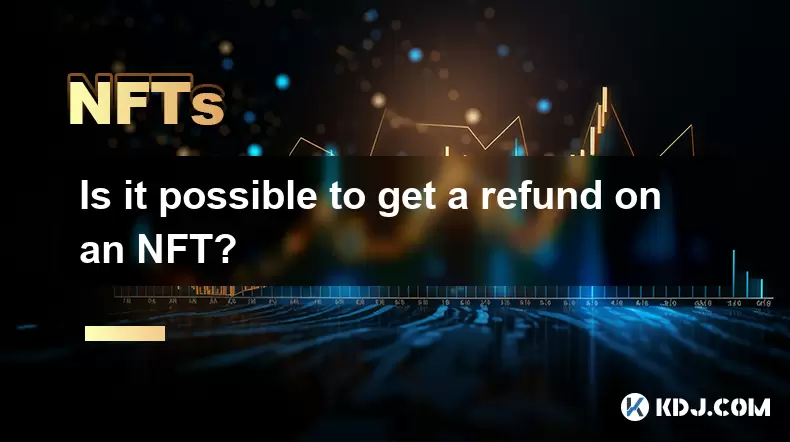
Is it possible to get a refund on an NFT?
Jul 21,2025 at 08:35pm
Understanding NFT Transactions and RefundsWhen you purchase an NFT (Non-Fungible Token), the transaction is typically recorded on a blockchain, making...
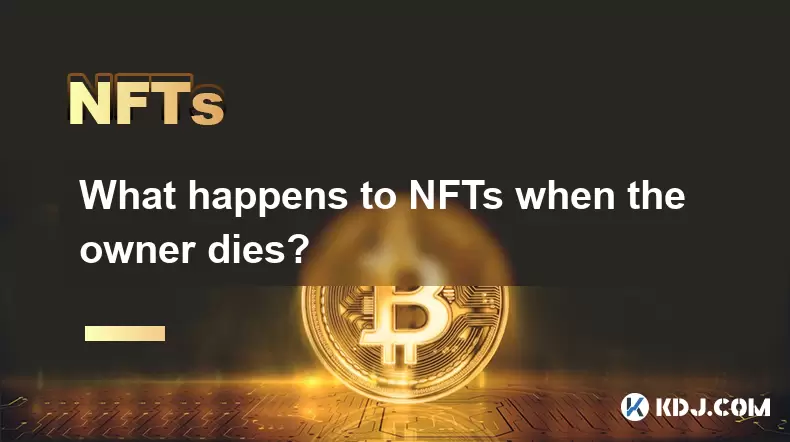
What happens to NFTs when the owner dies?
Jul 22,2025 at 02:43pm
Legal Ownership and Digital AssetsWhen an individual owns NFTs, the question of what happens to these assets upon their death is a pressing one. NFTs ...
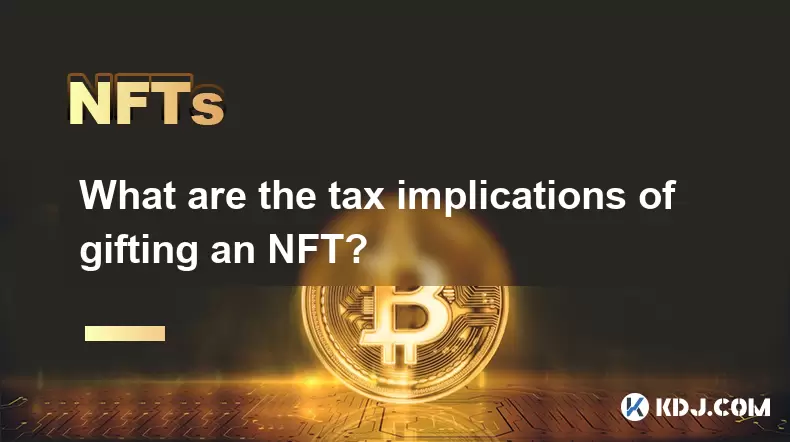
What are the tax implications of gifting an NFT?
Jul 19,2025 at 04:21am
Understanding the Basics of NFT GiftingGifting a Non-Fungible Token (NFT) involves transferring ownership from one individual to another without recei...
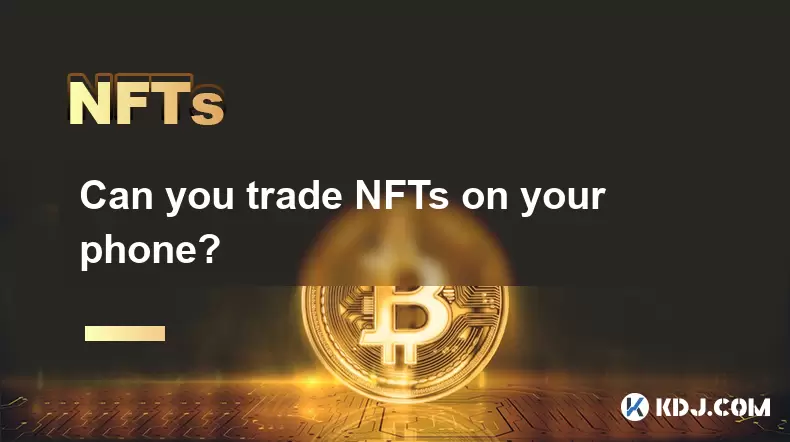
Can you trade NFTs on your phone?
Jul 18,2025 at 04:29am
Trading NFTs on Mobile DevicesYes, you can trade NFTs on your phone, and the process has become increasingly streamlined thanks to a variety of mobile...
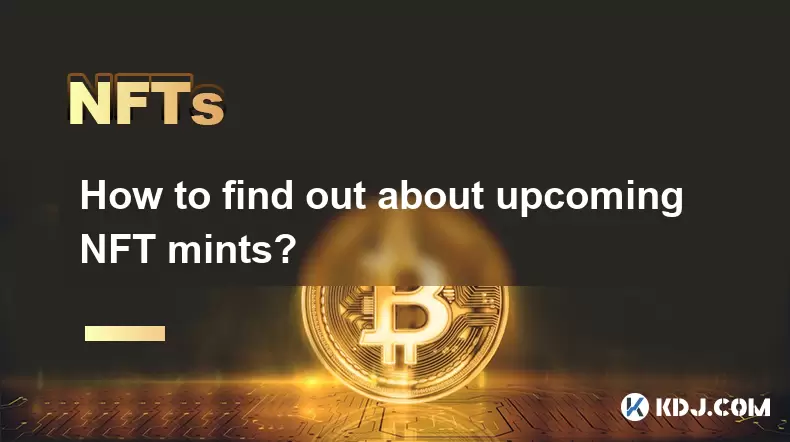
How to find out about upcoming NFT mints?
Jul 18,2025 at 11:50am
Exploring NFT Minting OpportunitiesUnderstanding the landscape of upcoming NFT mints is crucial for collectors, investors, and creators who wish to st...
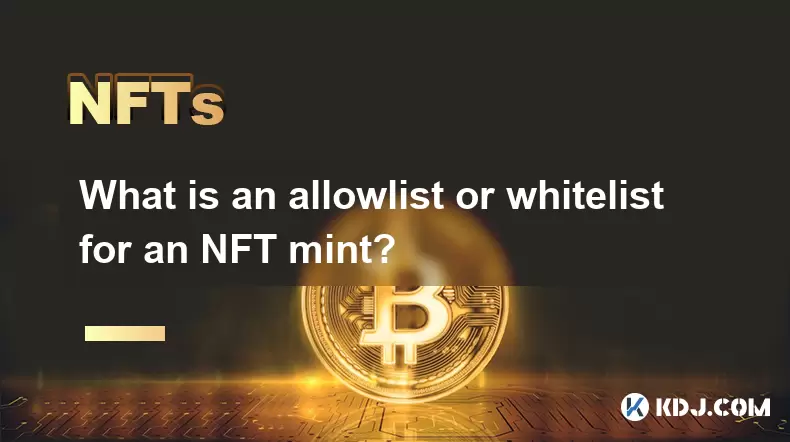
What is an allowlist or whitelist for an NFT mint?
Jul 20,2025 at 07:14pm
Understanding the Concept of an Allowlist for NFT MintingAn allowlist, also commonly referred to as a whitelist, is a mechanism used in the NFT mintin...

Is it possible to get a refund on an NFT?
Jul 21,2025 at 08:35pm
Understanding NFT Transactions and RefundsWhen you purchase an NFT (Non-Fungible Token), the transaction is typically recorded on a blockchain, making...

What happens to NFTs when the owner dies?
Jul 22,2025 at 02:43pm
Legal Ownership and Digital AssetsWhen an individual owns NFTs, the question of what happens to these assets upon their death is a pressing one. NFTs ...

What are the tax implications of gifting an NFT?
Jul 19,2025 at 04:21am
Understanding the Basics of NFT GiftingGifting a Non-Fungible Token (NFT) involves transferring ownership from one individual to another without recei...

Can you trade NFTs on your phone?
Jul 18,2025 at 04:29am
Trading NFTs on Mobile DevicesYes, you can trade NFTs on your phone, and the process has become increasingly streamlined thanks to a variety of mobile...

How to find out about upcoming NFT mints?
Jul 18,2025 at 11:50am
Exploring NFT Minting OpportunitiesUnderstanding the landscape of upcoming NFT mints is crucial for collectors, investors, and creators who wish to st...

What is an allowlist or whitelist for an NFT mint?
Jul 20,2025 at 07:14pm
Understanding the Concept of an Allowlist for NFT MintingAn allowlist, also commonly referred to as a whitelist, is a mechanism used in the NFT mintin...
See all articles

























































































